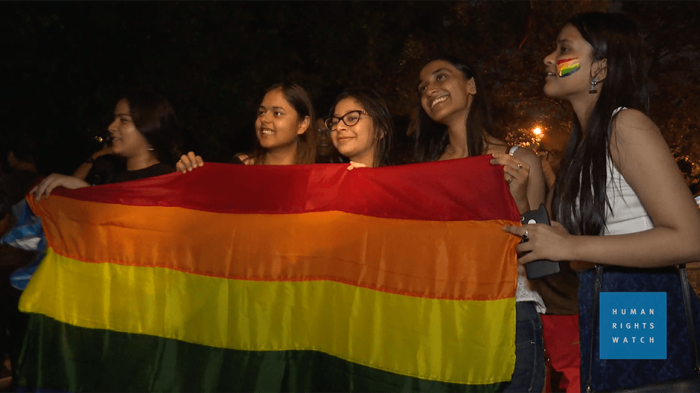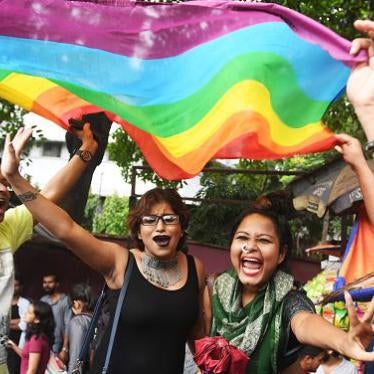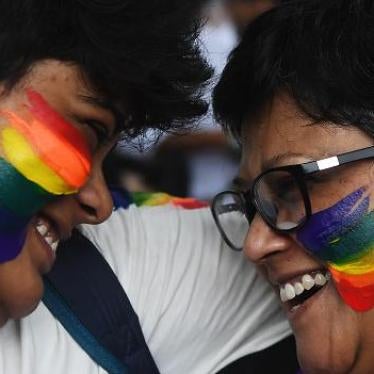In a historic ruling, India’s Supreme Court struck down parts of a colonial-era law that criminalised homosexuality. Jayshree Bajoria spoke to Arif Jafar, an LGBT activist who was arrested under section 377 and spent 47 days in prison.
“It was very traumatic,” recalls Arif Jafar, 47, outside the Supreme Court, where Thursday’s landmark ruling was delivered.
A short, bespectacled man, he wears a shiny pink button on his shirt supporting the cause dearest to his heart.
“Being denied drinking water ... being beaten up every day just because of my sexual orientation was a really horrible experience. It took me almost 17 years to even talk about it,” he said.
Jafar is one of a clutch of petitioners who approached the top court, asking them to reconsider a 2013 ruling which upheld the colonial-era law, under which homosexuality was a crime.
The law, a relic of British colonial rule, was rarely enforced. But it had long been used to discriminate against LGBT people and as a means for the police and others to harass, extort and blackmail them, members of the community say.
But for Jafar, who identifies as gay and is an LGBT activist based in Lucknow, the law went far beyond being a mere tool for persecution.
Along with four of his colleagues at the Bharosa Trust, a community-based organisation providing information, counselling, outreach, and peer support for homosexual and transgender people, Jafar was arrested under section 377 on 8 July 2001.
Before they were formally arrested, officers beat the men up in public.
‘A Homosexual Conspiracy’
Police also raided their offices and seized literature on gender, sexuality, and safe sex, and stacks of condoms, as well as a few sex toys used for demonstration purposes. All these were exhibited as evidence of their “perversion.”
“By evening, the [Indian television news channels] were splashing bulletins of a ‘gay sex racket’ and discussing theories of how I had taken funding from Pakistan to make all Indian men homosexual,” Jafar wrote in February 2018 when he finally broke his long silence about his 47 days in jail.
Police told the court that Jafar and his colleagues were part of a conspiracy to promote homosexuality. The men’s repeated pleas for bail were rejected. Jafar alleges that he and his colleagues were singled out for torture and humiliation by some police officers because of their revulsion for homosexuality.
In April 2017, two months after he finally spoke out about his ordeal, Jafar filed his petition before the Supreme Court.
The latest hearings followed a long struggle for the decriminalisation of same-sex relationships in India.
In 2013, the Supreme Court had set aside a 2009 Delhi High Court decision that section 377 would no longer apply to consensual sexual activity among adults. In reversing that decision, the Supreme Court had noted that there was insufficient evidence to prove that sexual minorities were being subjected to discriminatory treatment from the state or society.
“So I wanted to bring out my story of how I and my colleagues were affected by the law and how we are still affected 17 years later,” he said.
The case against Jafar and his colleagues has still not been resolved.
But with Thursday’s ruling, Jafar says he has finally found some solace.
Justice Indu Malhotra, one of the five judges who delivered the unanimous ruling, wrote: “History owes an apology to the members of this community and their families, for the delay in providing redressal for the ignominy and ostracism that they have suffered through the centuries. The members of this community were compelled to live a life full of fear of reprisal and persecution.”
Jafar was emotional as he recited those words to me outside the Supreme Court.
“Those words really mean a lot to us. All this journey of 30 years was worth it. Today’s judgment has made it worth it.”









